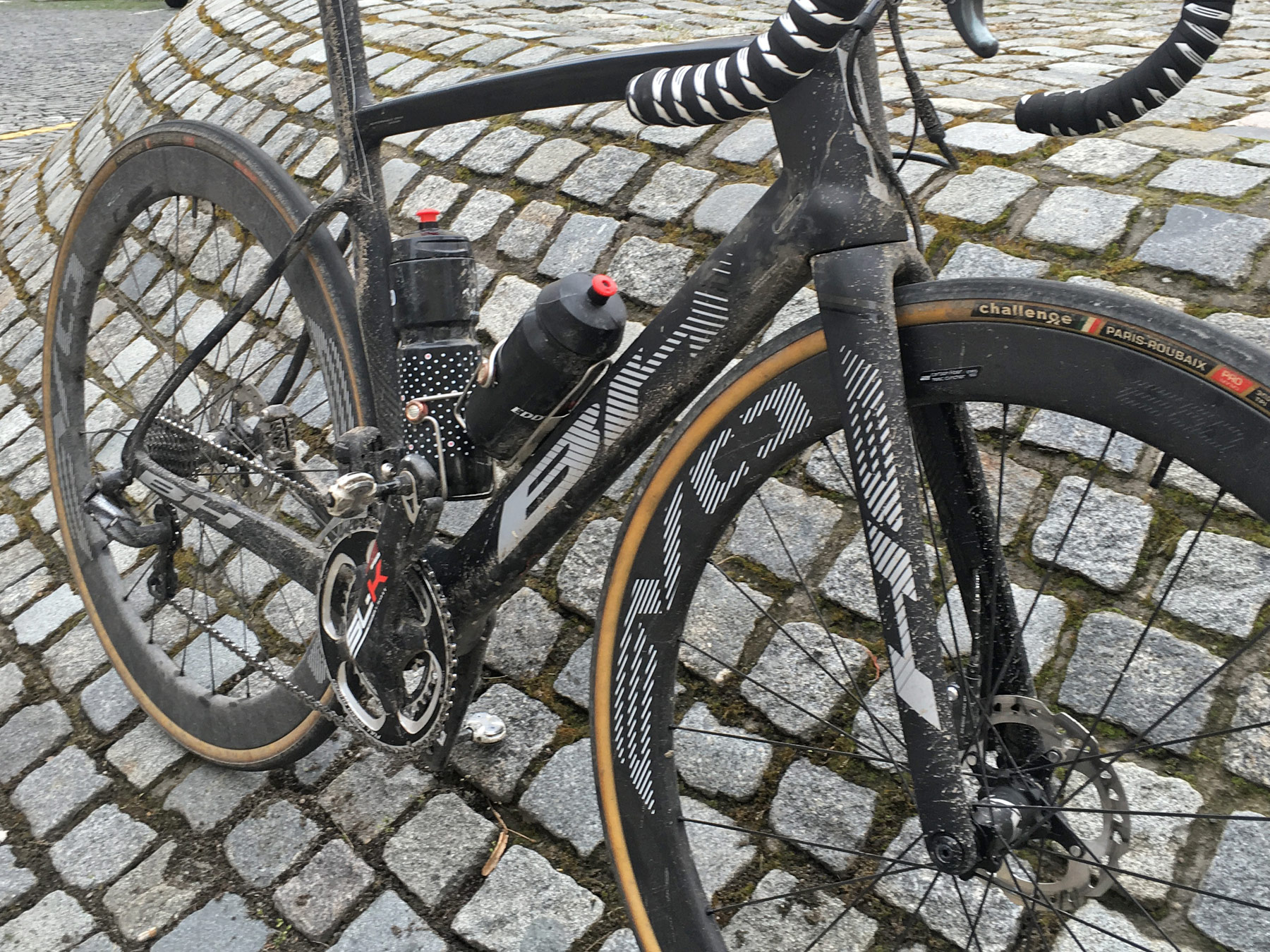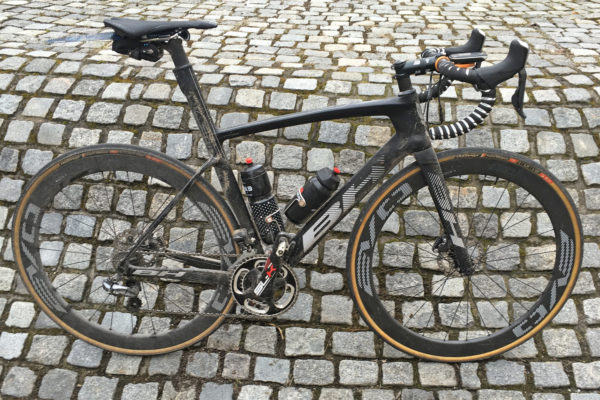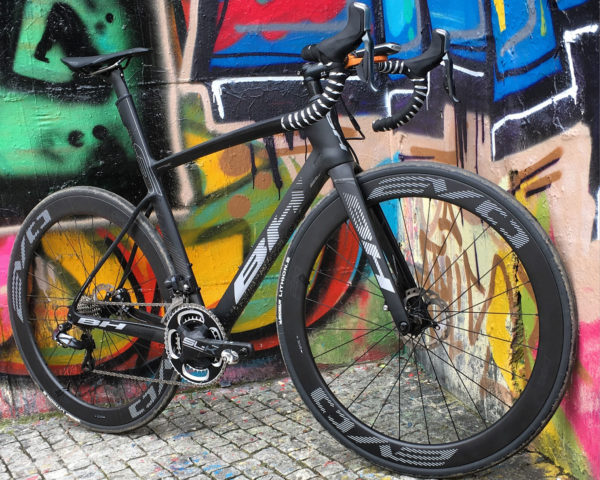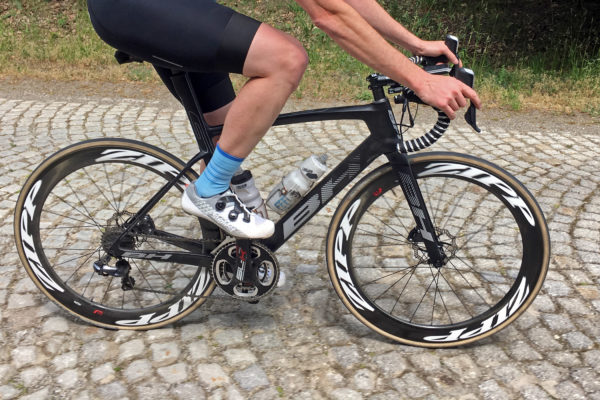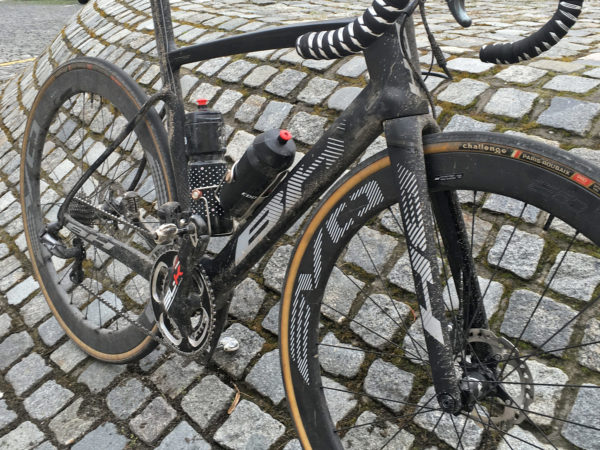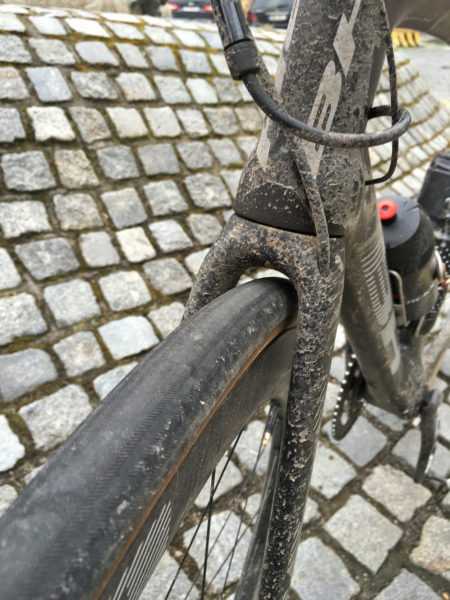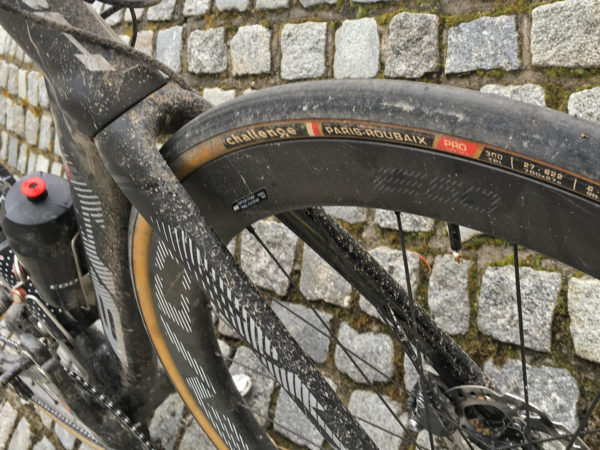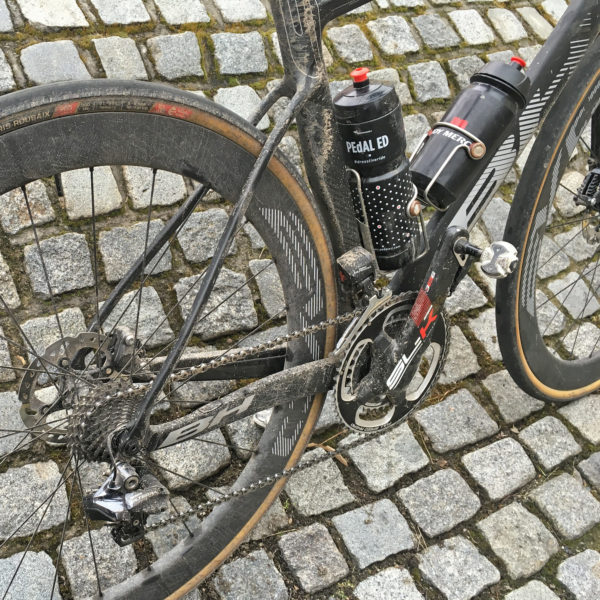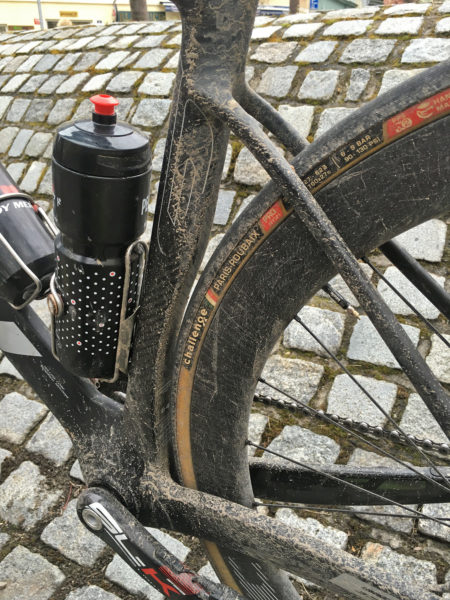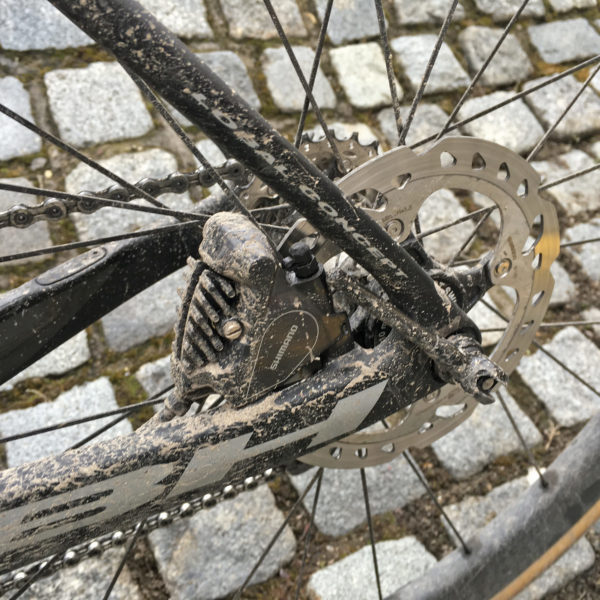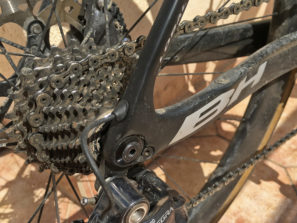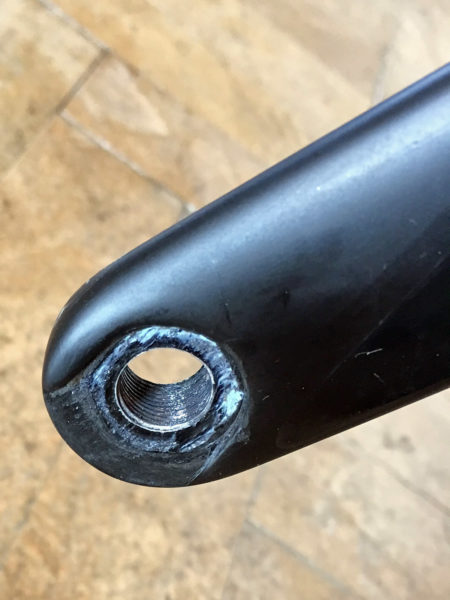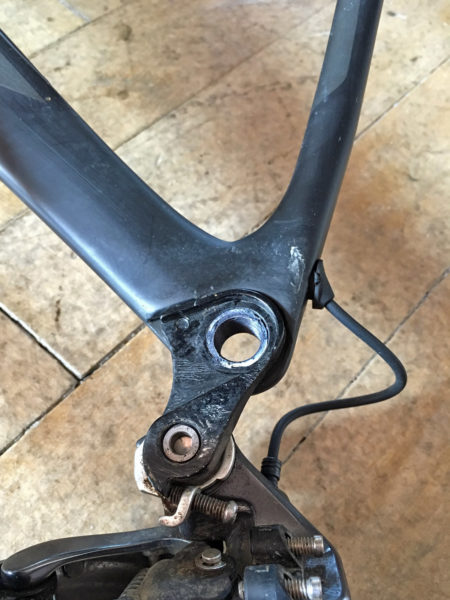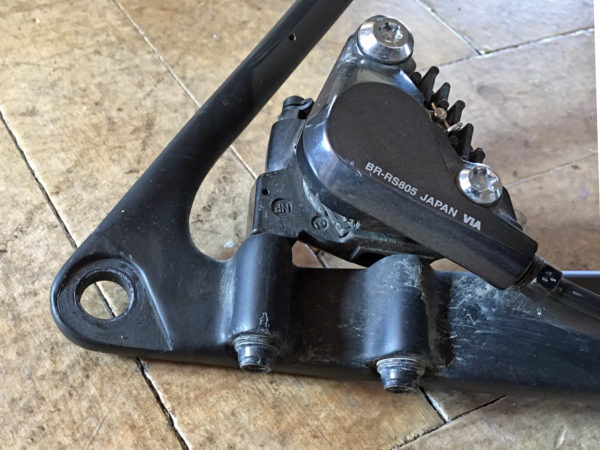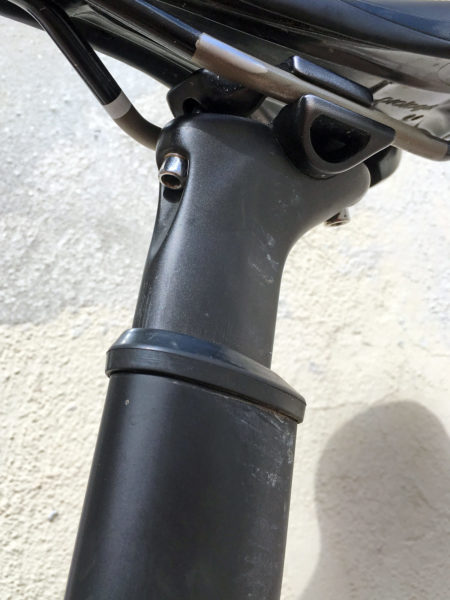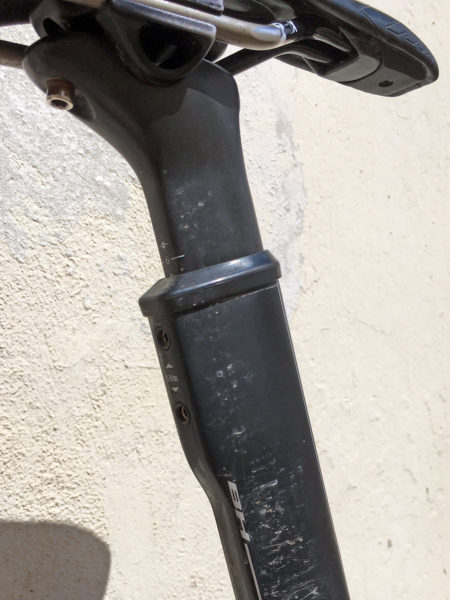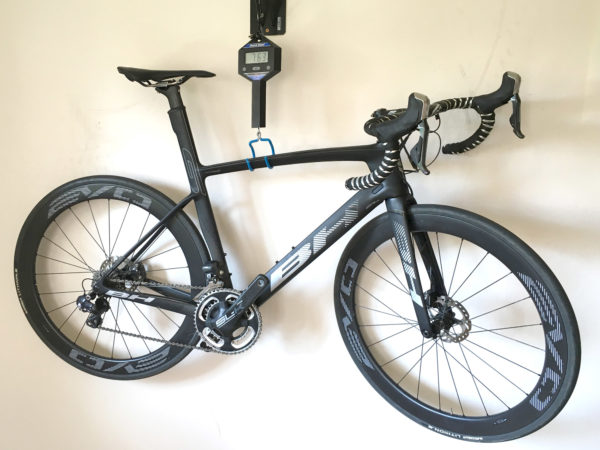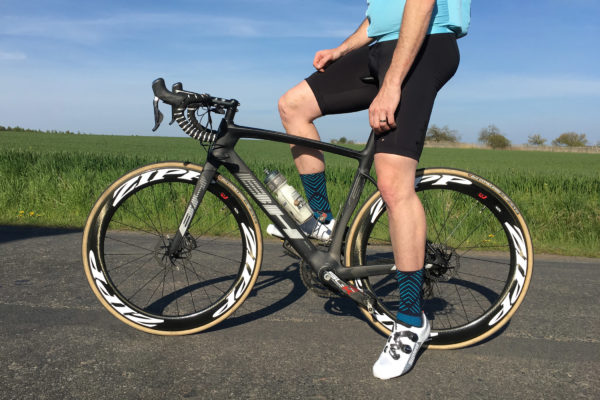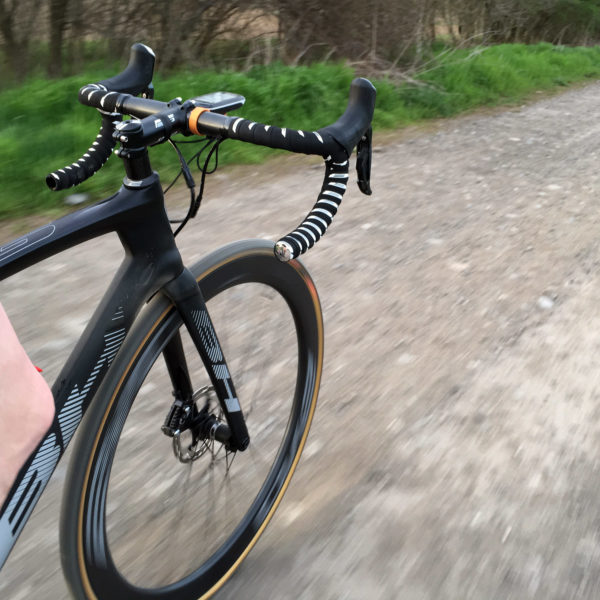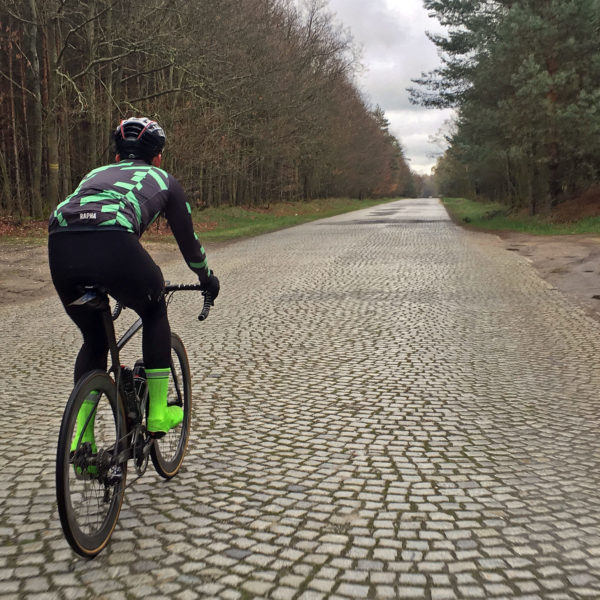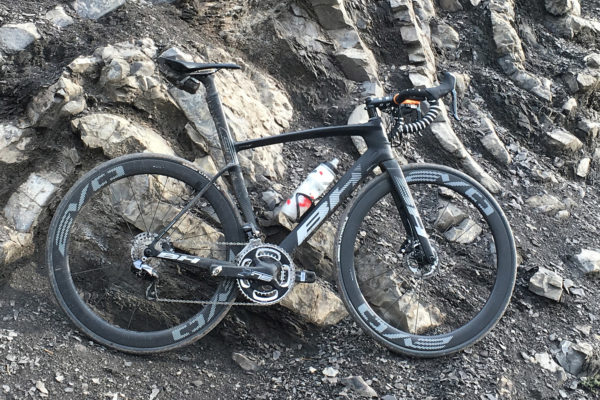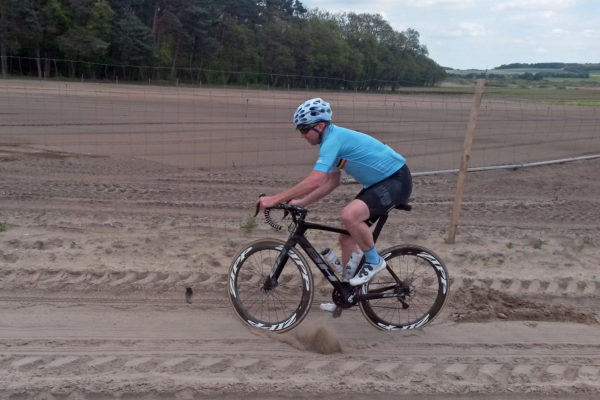The BH G7 Disc was introduced back leading into Eurobike 2015 and offered the promise of a pro-level aero road bike with a bit more versatility. As one of the first companies to commit to going disc brake-only for their top road bike redesign, BH put their neck on the line as their French Pro Continental team Direct Énergie was preparing to race the bike in the 2016 Spring Classics. That didn’t pan out, but nonetheless the vast majority of us don’t race under the UCI (although rounded rotors are coming back soon), so the thought of a pro-level aero bike built with tire clearance and disc brakes for the Classics certainly sounded like something we wanted to try. So we spent more than half a year testing the G7 from the pavé & bergs of Flanders to our own home cobblestones and back roads. We even did some non-UCI racing on it too, and were quite pleased with its fast ride…
The G7 Disc is the flagship aero road bike from Spanish bikemaker BH. It was a big improvement on the old school aero optimizations of the previous rim brake G6 with a new narrower profile, dropped seatstays, and partial seat mast. It has been available for just under a year now, and is about to be joined at the top of the BH road line by the new disc brake-only Ultralight Evo, which shares some similar tech in a less aero, lightweight climbing machine.
As our home roads around our European HQ tend towards the rough and tumble with all manner of broken asphalt, cobblestones & dirt, the idea of a fast rolling premium road bike up to that challenge was more than appealing. We almost exclusively ride disc brakes on the road here and try to spend as little time as possible on any tire smaller than 27mm, so until recently the possibility for an aero carbon bike was quite limited.
The BH G7 Disc gave us the excuse to put on an aero helmet and pound the pavé, but it also made a good test sled for some other goodies, like aero disc brake Zipp 404 Disc clinchers, fast-rolling Vittoria Corsa Speed tires, and all-surface friendly wide Challenge clinchers, to name a few.
After riding the G7 Disc around Flanders last Spring on the iconic hellingen in the days before and then day-of chasing the peloton during the Ronde van Vlaanderen, we brought the BH back to ride around Central Europe. The bulk of the kilometers we then put in on the bike were on the rolling roads surrounding our Prague base, doing mid to long distance road rides where most every ride ended up on some dirt or gravel roads at least once. While the bike came to us with a set of 25mm Michelin tires, with plenty of extra room we mostly stuck with a larger than advertised set of Challenge Paris-Roubaixs that offered 29mm of float to tackle dry, loose, and wet road surfaces. To take on a couple of amateur road races, a local hilly time trial, and for a few rides on smoother asphalt we did swap in a set of 23mm clinchers to push the aero side of this disc brake bike.
Tech Details & Actual Weight
Internationally the G7 Disc is available in just three builds with either Dura-Ace Di2, Ultegra Di2, or Ultegra mechanical, all with the same non-series R785 hydraulic levers. Our complete bike was sporting the middle 6500€/$4800 setup and paired a FSA SLK compact crankset and BH’s house Evo 50 disc brake carbon clincher wheels. (As an aside, in the US the complete bike mostly as we tested it is on a pretty massive sale, although sizing availability isn’t clear.) In some markets a frame kit is also available.
The bike has plenty of clearance around the fork, stays, and cutout seattube for the 29.2mm actual width tires that we usually rode, and only once when a dirt road dead ended into a field did we ever have any issue with dirt, mud or grime build-up hitting either frame or fork. The G7 gets internal cable routing inside the fork leg and from either side of the downtube. Since we were rocking the Di2 bike, a single non-driveside wire used the one modular cable port just below the hole for the rear brake line. The bike gets a full carbon 1.125-1.5″ tapered fork inside of a headtube that is rather wide for an aero bike. There are several other aero tricks on the bike, but it does keep a fairly broad front end to ensure steering precision.
Moving toward the back you can see more of the aero focus. The downtube gets a tall aero foil shape with a squared-off top edge à la Kamm tail, and at the tall bottom bracket it joins a narrow and again aero shaped seattube. That seattube has a small wheel cutout that keeps chainstay length down to just 402mm across all three sizes of the G7, while maintaining clearance for 30mm tires. Like most road bikes with short stays and electronic front derailleurs, it was relatively tight between the tire and the body of the Di2 derailleur. Even with our wide tires there was still ~3-5mm left, but it was certainly the closest spot between the tire and the bike.
The G7’s toptube also has an aerodynamically optimized shape, transitioning smoothly from the head tube back to the more narrow seat cluster with its triangular shape. The rear triangle gets more optimized shaping, with dropped aero-shaped seatstays that are slim enough to damp vibrations and a set of tall squared-off chainstays for excellent power transfer. The G7 uses a Press Fit 386 bottom bracket, and we had no issues quickly swapping out another identical (except for decal color) set of SLK 386 cranks on which we were testing an early prototype of the Watteam Powerbeat power meter.
The G7 uses the recent flat mount disc brake standard front & rear with 140mm Shimano IceTech Freeza rotors, as well as 12mm thru-axles at both ends. In a bid to save weight but maintain ease of use, BH includes a pair of house-branded light QR thru-axles. They use a similar external cam design with a tiny carbon lever like we’ve seen from Tune, but don’t seem to offer enough leverage to feel all that secure. But with that being said never faltered in our use.
Those thru-axle dropouts also include some fairly nicely designed slots for the axles. It might seem to be a minor concern, but many thru-axle road and cross bikes still use a smooth inner surface at the dropout, where you have to align the wheel by eye as you slide the axle in place. The reasoning is that the internal diameter of the hub/outer of the axle (12mm here) is defined, but the outer diameter of the hub’s endcaps where it rests against the dropout can vary. It is less of a concern on the fork, but on the rear wheel with the chain pulling on the driveside not having a slot will almost always slow down wheel changes, and if it pulls too much can actually tweak the rotor that is already in place on the non-driveside where the axle has already been slid in a ways. In any case, the slots on this BH worked well for us with a few wheelsets (BH, Zipp & DT), and we appreciated it.
The G7 sits your saddle atop an abbreviated aero seatpost that slides inside the extended seattube/mast. It lets BH keep the tubing shapes and seat cluster smooth while still offering decent seat height adjustability. The layout of the set-back seatpost head’s two bolts meant some of our regular P & T-handled wrenches wouldn’t fit making it a bit slower to adjust the saddle. The proprietary shape post is held in place by a small integrated seatpost clamp that presses two 3mm set screws against a small piece of metal inside the mast that in turn presses the seatpost against the inside of the mast. While we were a bit skeptical of the setup, tightened down to the correct torque, it never slipped or made any noise.
The bike puts the Di2 battery inside of the short seatpost too. BH has made a small clamp for the aero post the securely locks the battery in place with a rubber wedge. We had a battery failure, presumably unrelated to the bike itself and had little trouble pulling out and replacing it inside the seatpost without it every coming loose, moving, or rattling while riding.
Our complete size medium test bike weighed in at 7.63kg/16.8lb without pedals, with its clinchers and tubes. Geometry-wise it carries over the road race-proven geometry of the previous G6. That essentially translates to a 73° headtube angle and 72.5° seattube, paired together with short stays for a snappy feel.
Objectively we wondered why an aero road bike would come with compact gearing. The 50×11 hardest gear was actually pretty easy to get up to, and riding in a fast-moving pack or on extended descents we definitely felt under geared, and a swap to a mid compact 52/36 set of rings significantly improved the overall feel of the bike.
Ride Review
No matter what road surfaces we pedaled on the G7, we could sum up the thoughts of our multiple testers with one word: fast! The bike just feels quick to ride, and feels like it really wants to go fast. Power transfer from the stiff bottom bracket down the short chainstays to the rear wheel gives off a sense of being directly connected from the pedals to the rear wheel, and the rigid front end made steering it through turns quick and predictable.
In reality we weren’t always pinning it on the G7, but the bike still rolled down the road as easily as you could hope. BH’s own 50mm deep house brand wheels also did a solid job of competing even with Zipp 404s, which could probably claim to be an industry benchmark. In a straight sprint the 404s might have edged them out at the line, but the BH Evo 50 Disc wheels with their wide blunt nose and 18mm internal/24.2mm external width at the bead, handled as well or better in crosswinds, and packed in smooth rolling bearings during the length of our test. You still felt blown around a bit in strong winds, but much like Swiss Side explained to us at the recent introduction of DT Swiss’ new aero endurance wheel, the BH wheels seemed to transition to stall more smoothly, making for a predictable and comfortable ride in gusty conditions.
Over the course of our test we did set a number of personal best times on some of our favorite segments. A few of those will likely stand for a while, as they were on some rough sections of gravel roads and pavé that before we hopped on the G7 were more likely to be ridden on an endurance or even cross bike. While the front end of the G7 is quite stiff, the thin seatstays and their position dropped down below the traditional seat cluster actually provide a very comfortable ride, to the point that we were often surprised how fresh our backs felt after long rides on rough roads.
It really is this combination of clearance for wide plush tires, a bump absorbing rear end, and the aero shaping that made this bike the first one we would pull out of the quiver for all sorts of road rides. The roughest roads and cobblestone routes that had normally been reserved for more upright and cushy all-road bikes, could now be taken at higher speeds with the same aero road bike designed for the pro peloton.
It wasn’t all roses for the G7. The fact that it damps a lot of the rough road surface also means that the ride feel on smooth tarmac is a bit muffled or even dull. It’s always a compromise, but our more race-focused tester equated it to feeling like he had all the power available at his fingertips but not enough positive feedback from the road. At the same time our dirt road advocate appreciated the comfort at speed. The front end of the bike is also certainly more stiff than the rear. Our shortest tester used a 90mm stem to dial in his fit, and that combo exasperated exacerbated an excessively stiff front end, despite the flexy handlebars, to the point that extended riding on cobbled roads at speed made his wrists hurt. With the regular 110mm stem, and a longer 120mm one from Ritchey our other testers felt the bumps but didn’t complain about wrist pain.
Besides being spec’d with a too small 50/34 compact crank, this aero bike also came with BH’s noodly Evo Wing carbon handlebar. While the bar was comfortable on the aero-shaped tops, on the hoods there was noticeable flex (which may have helped damp vibrations), and in the drops we could flex the bar almost a centimeter either way. Anyone looking for the fast ride of a pro-level aero bike would probably benefit from putting a stiffer bar on from the start. (US specs of the bike do include a stiffer Easton carbon bar.)
We’re not 100% sold on the idea of the proprietary seat mast and post either. Our tester who raced the bike in a local time trial also wanted to slap on a set of clip-on aerobars for that event, but was limited by the seatpost head setback to get his position farther forward, which a standard post (even in an aero shape) would have allowed with more post options. He also had considered packing the bike in his travel case to ride it in Spain, but the extended mast was too tall for his bike bag.
Tucked down & racing on disc brakes also takes some getting used to. The brakes are so responsive that our in-house roadie would occasionally touch the levers when stretched out low on top of the hoods. It is certainly no fault of the bike, but it annoyed him when pushing hard. It is more of a sign that with more new disc brake lever shapes coming to fast road bikes, a lot of riders will need to adapt how we hold onto the bike in our all-out attempts to get aero and go fast.
The only real bad thing we experienced on the bike was the noise. The hydraulic hose routing goes inside the downtube, and the open cable port has no mechanism to clamp the hose, so it rattles around inside the carbon frame, a lot. On dirt and gravel roads is was pretty loud, but riding on cobblestones it was almost amusingly loud. There isn’t too much of a fix either. Although we did have some luck by marking where the hose went into the frame, unbolting the rear caliper from the chainstay, pulling the hose out a few centimeters, wrapping some electrical tape around where we marked, then pulling the brake line back until the tape-wrapped hose was tensioned into the cable port.
When out of the saddle and pushing really hard we could also get the fork to flex enough to make the front rotor rub a bit. It didn’t happen every time we would stand to climb, but it could be a bit unnerving in a sprint.
Final Thoughts
Tire clearance was apparently a big driver of development when BH made the decision to go disc-only for their top-level aero road bike. They wanted to be able to combine race-ready aerodynamic benefits with the ability to fit the fat tires that make the Spring Classics ridable (and that disc brakes allow). It is probably those two points that then can sum up our impressions of the bike. It slices through the air quickly, and can take on the most challenging road surfaces with 27-30mm tires.
While our more road race-focused tester saw the bike as a compromise, from a mountain biking and cyclocross background I personally see the BH G7 Disc as my ideal type of road bike. It has all of the fast-moving aero benefits I could hope for in a road bike that is still ready and willing to leave the smooth tarmac at any opportunity. I don’t usually rate my rides by how fast my average speed was, but looking back at the data the G7 pushed me to ride faster, while still being fun to ride across cobblestones, gravel, and even the occasional loose sandy dirt road.
